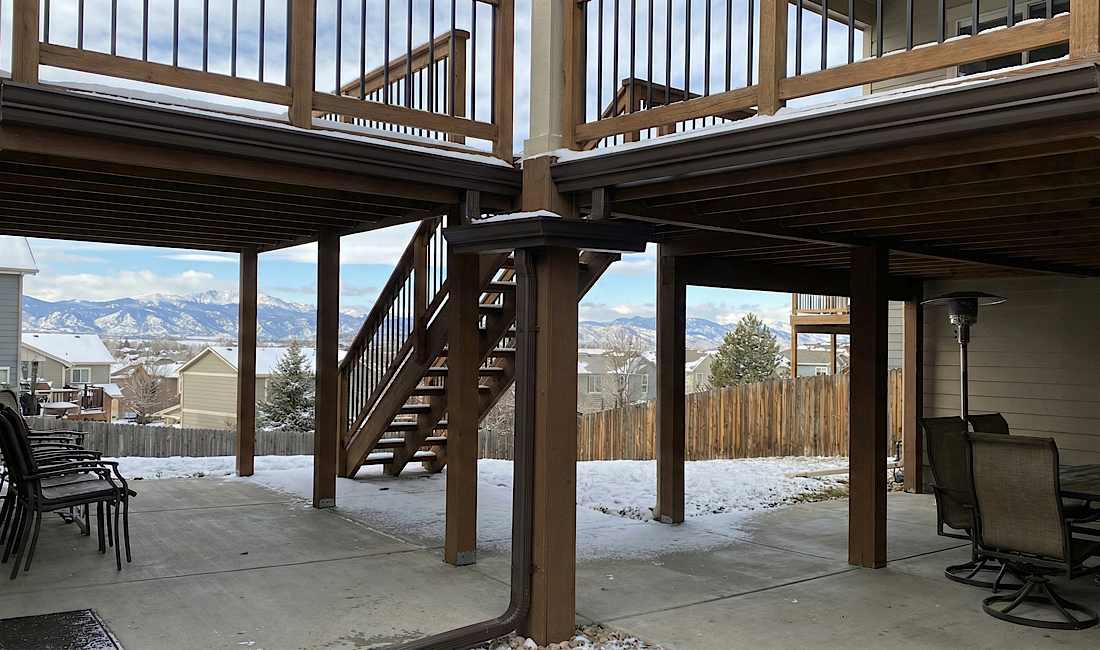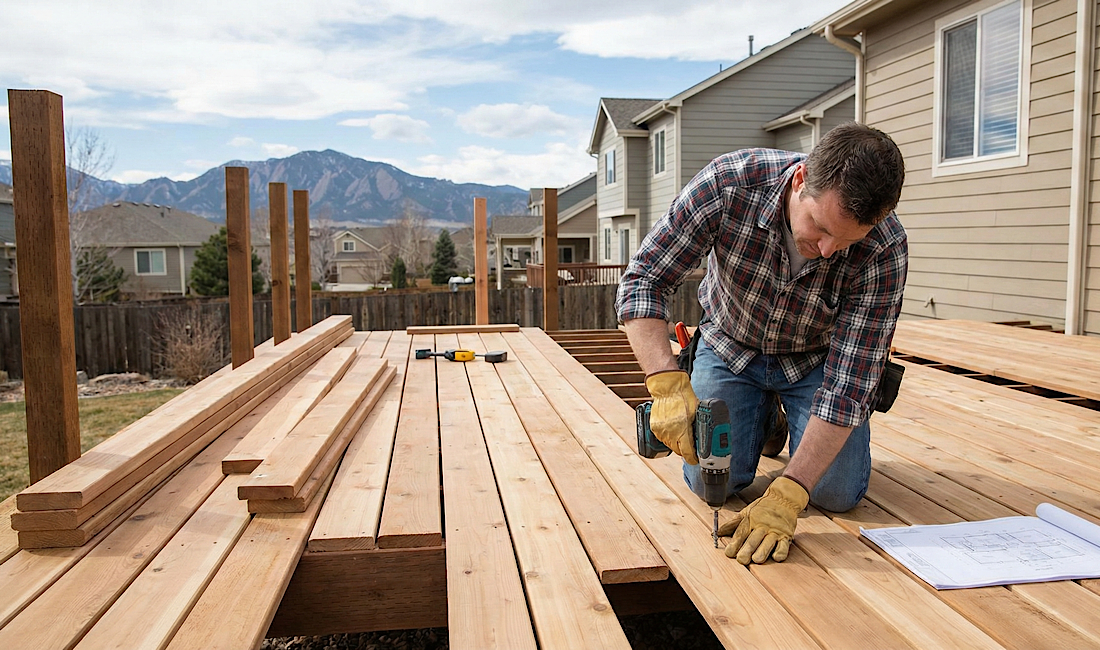How Denver’s Climate Impacts Deck Lifespan (Winter Edition)
Denver’s climate is as dynamic as its mountain views. Homeowners face unique challenges in protecting outdoor spaces, particularly decks, from the wear and tear of winter. The combination of heavy snowfall, rapid freeze-thaw cycles, and intense sun exposure at high altitude can significantly shorten a deck’s lifespan if preventative steps aren’t taken. Centennial Custom Decks has worked with countless Colorado families to design and weather-proof decks that not only look beautiful but also stand strong against Denver’s toughest conditions.
This guide explores how winter weather impacts deck performance, common failure points, and proven strategies to extend your deck’s durability well beyond the average lifespan.
The Freeze-Thaw Factor: Denver’s Biggest Deck Challenge
One of the most damaging aspects of Denver’s winters isn’t just snow—it’s the cycle of freezing and thawing. The city averages over 57 inches of snowfall annually, but due to elevation and fluctuating temperatures, snow often melts during the day and refreezes overnight.
How Freeze-Thaw Affects Decks
- Wood decks: Absorb water during melting. When temperatures drop, trapped moisture expands, leading to cracks, splits, and eventual rot.
- Composite decking: Resists moisture infiltration but can still expand and contract, loosening fasteners if improperly installed.
- Hardware and fasteners: Freeze-thaw cycles cause corrosion and loosening of screws, nails, and bolts, weakening the entire structure.
Centennial Custom Decks emphasizes that this cycle is the number one factor in Denver that shortens deck lifespan. Without proactive maintenance, decks that should last 20+ years may deteriorate in half that time.
Snow and Ice Loads: Stress on Structural Integrity
Denver’s elevation and snowfall mean decks must support heavy loads of snow and ice during peak winter months. While building codes account for weight loads, poorly maintained decks can struggle under the stress.
- Snow accumulation: Puts direct pressure on joists and framing.
- Ice sheets: Add extra weight and trap moisture against decking boards.
- Delayed clearing: Allowing snow to pile up leads to faster deterioration of materials and increases the risk of collapse.
A strong substructure, especially steel or pressure-treated lumber framing, is critical in Colorado’s climate. Centennial Custom Decks often reinforces older decks or recommends steel framing for long-term resilience.
Sun Exposure at High Altitude
Winter damage isn’t only about cold. At Denver’s elevation, UV exposure is significantly higher, even during snowy months. Deck surfaces exposed to sun may fade, dry out, and weaken.
- Wood: Becomes brittle and splinters without UV-protective sealants.
- Composites: Perform better but still benefit from UV-stable coatings to maintain appearance.
- Finishes: Unsealed stains and paints break down faster at altitude, requiring more frequent maintenance.
This dual threat—UV by day, freezing by night—makes Denver’s winter climate especially harsh on outdoor living spaces.
Weather-Proofing Strategies for Maximum Durability
Centennial Custom Decks recommends a multi-layered approach to extending deck lifespan through Denver winters.
1. Seal and Protect Materials
- Apply high-quality water-repellent sealants every 2–3 years for wood decks.
- Choose composite or PVC boards designed for high-moisture, high-altitude conditions.
- Select finishes with UV protection to resist fading and cracking.
2. Strengthen Substructure
- Use galvanized or stainless steel fasteners to resist corrosion.
- Consider steel deck framing, which outlasts wood by decades and resists freeze-thaw stress.
- Ensure joists and beams are properly flashed to prevent water infiltration.
3. Manage Snow and Ice Proactively
- Shovel with a plastic shovel, moving parallel to decking boards.
- Avoid rock salt; use calcium chloride-based ice melt safe for decking materials.
- Clear snow frequently to prevent excess load and trapped moisture.
4. Optimize Design for Denver’s Climate
- Incorporate proper drainage systems so snowmelt flows away from the deck.
- Add pergolas, awnings, or partial covers to reduce direct UV and snow exposure.
- Choose slip-resistant surfaces for safety during icy months.
Deck Lifespan Expectations in Denver
The average wood deck in Colorado lasts 10–15 years without consistent upkeep, compared to 25–30 years for composite decks and 50+ years for steel-framed options with composite surfaces.
By following weather-proofing strategies, Centennial Custom Decks has helped Denver homeowners double the lifespan of their outdoor spaces. This means fewer costly rebuilds and more years of safe, beautiful use for gatherings, holidays, and everyday living.
FAQs About Deck Durability in Denver Winters
How often should I reseal my deck in Denver?
Wood decks should be resealed every 2–3 years. South-facing decks with higher sun exposure may require sealing annually.
Is composite decking maintenance-free in winter?
No. While composites resist rot and warping, snow and ice can still create slippery conditions. Regular cleaning and snow removal are still essential.
What’s the best way to remove ice from a deck?
Avoid rock salt. Use calcium chloride or pet-safe ice melt products that won’t corrode fasteners or stain decking boards.
Do steel-framed decks perform better in winter?
Yes. Steel framing resists freeze-thaw damage, supports heavier snow loads, and lasts decades longer than wood.
Can Denver winters shorten the lifespan of new decks?
Yes—without proper weather-proofing. Even brand-new decks can suffer damage within a few years if exposed to unchecked freeze-thaw cycles, snow buildup, and sun exposure.
What’s the longest-lasting deck option for Colorado?
Composite or PVC decking installed on a steel frame is the most durable solution, often lasting 50 years or more with minimal maintenance.
Building Resilience into Outdoor Living
Denver’s winters can be tough on outdoor spaces, but they don’t have to shorten the life of your deck. By selecting the right materials, reinforcing structures, and committing to proactive maintenance, homeowners can enjoy safe, beautiful, and long-lasting decks for decades.
Centennial Custom Decks specializes in building and weather-proofing decks designed for Colorado’s unique climate. For families looking to protect their investment and enjoy outdoor living year-round, professional planning and expert craftsmanship make all the difference.
A deck should not only survive Denver’s winters—it should thrive through them, becoming a space that’s ready for spring gatherings the moment the snow melts.



